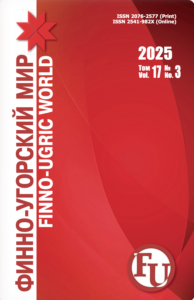DOI: 10.15507/2076-2577.011.2019.03.301-324
Igor V. Bakhlov,
Doctor of Political Sciences, Head of the Department of General History,
Political Science and Area Studies,
National Research Mordovia State University
(Saransk, Russia), bahlov@mail.ru
Olga V. Bakhlova,
Doctor of Political Sciences, Professor, Department of General History,
Political Science and Area Studies,
National Research Mordovia State University
(Saransk, Russia), olga.bahlova@gmail.com
Introduction. The special sensitivity of the ethno-national sphere to fluctuations in politics, increased vulnerability to destructive influence, negative historical experience of politicization of ethnicity elevate it to one of the priorities of the work of Federal and regional state bodies. The object of this study is the state national policy of the Russian Federation, the subject is the process and instruments of its implementation in the Finno-Ugric Republics in the Russian Federation, taking into account the state and dynamics of the system of Federal relations. The main tasks are to identify the stages of the evolution of approaches and management practices; to characterize the content and guidelines of official documents; to determine the essence and direction of changes in the considered perspective.
Materials and Methods. The study is based on the normative and conceptual-program documents of the Federal and regional levels in state national policy of the Russian Federation, materials posted on the official websites of the state authorities of the Finno-Ugric Republics that are the subjects of the Russian Federation. The main research methods are system, comparative and diachronic analysis, non-formalized traditional analysis of documents and the method of political diagnostics.
Results and Discussion. The study of a set of documentary and theoretical sources allowed us to trace the dynamics of approaches and practices of the Finno-Ugric Republics in the implementation of the state national policy of the Russian Federation. Attention was focused on two stages: the periods of 2000-2012 and 2012-2018, with a historical retrospection into the post-Soviet period. It shows the experience and correlation of initiatives and actions of Federal and regional level; compares research feedbacks; reveals key trends in modification of programs and target tools.
Conclusion. The experience of the Finno-Ugric Republics in the Russian Federation demonstrates a significant coincidence with the all-Russian trend of the Patriotic-state approach, with certain nuances arising from the specifics of the ethnodemographic situation, the resource potential of regions and political elites and, to a lesser extent from their location.
Keywords: state national policy of inter-ethnic (inter-ethnic) relationship; special purpose tools; the subject of the Russian Federation; Finno-Ugric Republic; ethnocultural development; ethnic and social development.
Acknowledgement: The research was carried out with the financial support of the Russian Foundation of Basic Research and the Autonomous Non-Profit Organization EISI, project No. 19-011-31009 “Professional expertise in state national and regional policy and improvement of mechanisms for assessing the effectiveness of territorial management”.
For citation: Bakhlov IV, Bakhlova OV. Implementation of the state national policy of the Russian Federation in the Finno-Ugric Republics, the subjects of the Russian Federation: evolution of approaches and practices (2000–2018). Finno-ugorskii mir = Finno-Ugric World. 2019; 11; 3: 301–324. (In Russian)






















